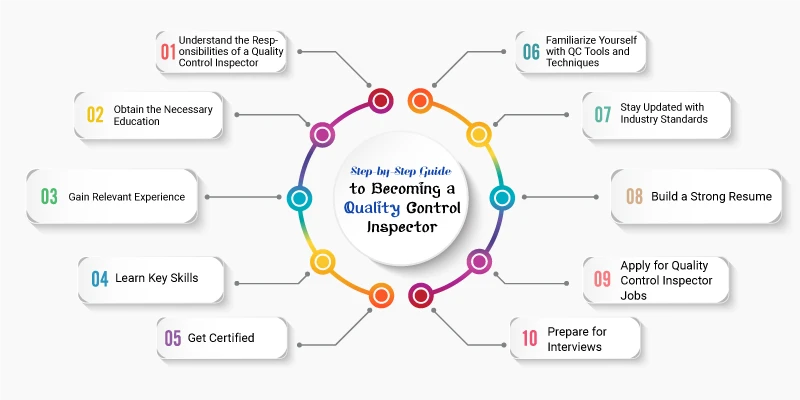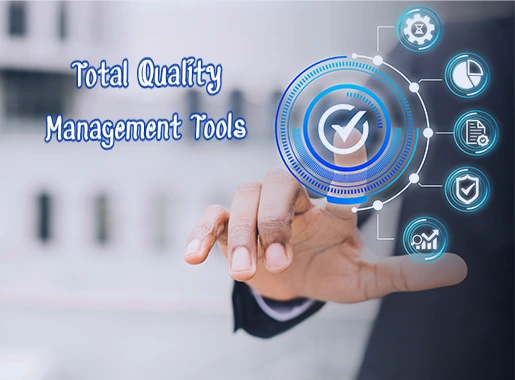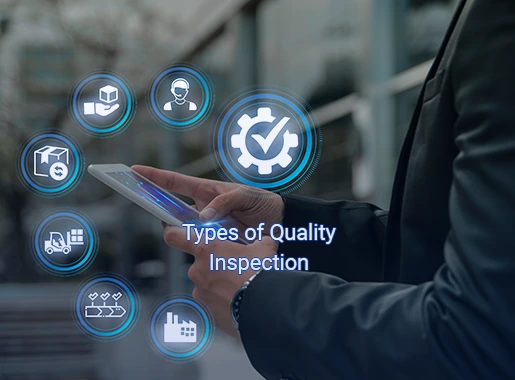How to Become a Quality Control Inspector
Quality Control (QC) Inspectors are responsible for testing, inspecting, and monitoring the manufacturing process. Their goal is to prevent defects and ensure that every product is produced to specification.

If you are interested in this field, becoming a Quality Control Inspector is a rewarding career path. This comprehensive guide will walk you through the steps to becoming a QC Inspector, from education to certification, and beyond.
What Does a Quality Inspector Do?
A quality inspector ensures that products adhere to established standards by thoroughly measuring and examining both raw materials and finished goods. This role involves conducting manual and visual inspections to verify compliance with regulations, as well as utilizing machines to test product quality. Typically working in a factory environment, quality inspectors follow a structured schedule while playing a crucial role in maintaining product standards and ensuring safety and reliability throughout the manufacturing process.
Step-by-Step Guide to Becoming a Quality Control Inspector
Follow these essential steps to build a successful career as a Quality Control Inspector and ensure the highest standards of product quality.

Step 1: Understand the Responsibilities of a Quality Control Inspector
As a QC Inspector, your daily responsibilities will involve a wide range of tasks, such as:
- Inspection: Inspect products or raw materials to verify that they meet the required specifications.
- Testing: Use various testing methods and tools to check product quality and performance.
- Documentation: Record inspection results and quality data for future reference or audits.
- Collaboration: Work closely with the production team to report quality issues and suggest improvements.
- Reporting: Communicate findings to management and suggest corrective actions when needed.
QC Inspectors are the last line of defense before products reach the consumer, ensuring that the final product meets customer expectations and industry regulations.
Step 2: Obtain the Necessary Education
While most QC Inspector positions require a high school diploma or GED, higher education can help you stand out in the job market. Many employers prefer candidates with postsecondary education, particularly in fields related to quality control or manufacturing.
- Associate’s Degree or Technical Certification: Consider enrolling in a quality control, engineering, or manufacturing program. These programs offer hands-on training and help you understand the technical aspects of quality control, which can be beneficial for your career.
- Advanced Education: A bachelor’s degree in manufacturing, industrial engineering, or quality management may also be beneficial for advanced positions or managerial roles.
Some employers also offer on-the-job training, so if you are just starting, hands-on experience might be enough to get your foot in the door.
Step 3: Gain Relevant Experience
Experience is essential for becoming a competent Quality Control Inspector. Many QC Inspectors begin their careers in entry-level positions in manufacturing or warehouse environments.
- Entry-Level Jobs: Look for positions as production assistants or factory workers where you can learn the basics of manufacturing processes and quality standards.
- Apprenticeships or Internships: Seek internships or apprenticeship programs that offer practical experience in quality control or testing. These positions help you build essential skills while under the supervision of experienced professionals.
The more experience you have with different manufacturing processes, the better your chances of advancing in the field.
Step 4: Learn Key Skills
Being a successful QC Inspector requires a blend of technical, analytical, and soft skills. Here are the key skills needed:
- Attention to Detail: QC Inspectors must be able to spot even the smallest defects in products or processes.
- Problem-Solving: You need to identify issues, investigate their root causes, and recommend corrective actions.
- Technical Knowledge: A QC Inspector must be familiar with various tools used for inspection, such as micrometers, calipers, and testing equipment.
- Analytical Thinking: You should be able to analyze inspection data and interpret results accurately.
- Communication Skills: Reporting findings clearly and collaborating with teams to resolve quality issues is crucial.
- Time Management: Managing multiple inspections and deadlines while ensuring quality standards are met requires strong organizational skills.
Developing these skills will help you perform your duties effectively and advance in your career.
Step 5: Get Certified
Although certification is not always a requirement, it can greatly enhance your qualifications. Certifications prove your knowledge and commitment to the profession, making you more competitive in the job market. Some of the most recognized certifications include:
- Certified Quality Inspector (CQI): Offered by the American Society for Quality (ASQ), this certification demonstrates your expertise in inspecting products and ensuring they meet quality standards.
- ISO 9001 Certification: Knowledge of ISO 9001, the international standard for quality management systems, is highly valued by employers worldwide.
- Six Sigma Certification: Six Sigma principles focus on process improvement and minimizing defects. Having a Six Sigma certification shows you can apply these methodologies to improve quality.
Getting certified will not only enhance your skills but also improve your job prospects and earning potential.
Step 6: Familiarize Yourself with QC Tools and Techniques
As a Quality Control Inspector, you will use various tools and techniques to measure product quality. Familiarizing yourself with these tools is essential to your role. Some of the most commonly used tools include:
- Measuring Instruments: Calipers, micrometers, and gauges for precise measurements of parts and materials.
- Testing Equipment: Tools to test durability, strength, and functionality of products.
- Statistical Tools: Control charts, histograms, and Pareto charts to analyze data and monitor quality trends.
- Software: Quality management software to track inspections, manage data, and generate reports.
Having proficiency in these tools will increase your effectiveness and make you an asset to any organization.
Also Read:Proven Quality Control Methods To Ensure Excellence
Step 7: Stay Updated with Industry Standards
The quality control industry is constantly evolving, with new technologies, regulations, and standards. To stay ahead in the field, you must keep up with industry trends and standards.
- Attend Workshops and Webinars: Participate in quality control training sessions, webinars, and conferences to stay updated on best practices.
- Join Professional Organizations: Becoming a member of groups like the American Society for Quality (ASQ) will provide access to resources, certifications, and networking opportunities.
- Read Industry Publications: Subscribe to quality control journals and magazines to learn about the latest tools and techniques in the field.
Continuous learning ensures that you are always prepared to meet the latest industry requirements and challenges.
Step 8: Build a Strong Resume
Once you’ve gained experience and earned certifications, it’s time to build your resume. Make sure to highlight the following:
- Relevant Certifications: Include any certifications like CQI, ISO 9001, or Six Sigma.
- Work Experience: List your work experience in manufacturing, quality control, or related roles, along with specific tasks you performed, such as inspections, reporting, or testing.
- Skills: Highlight technical skills (e.g., tools and equipment used) and soft skills (e.g., communication, problem-solving).
- Achievements: If applicable, mention any accomplishments like improving quality processes, reducing defects, or streamlining operations.
A strong resume will help you stand out to potential employers and secure interviews.
Step 9: Apply for Quality Control Inspector Jobs
With your education, experience, certifications, and resume ready, you can now apply for QC Inspector positions. Look for job openings in industries like:
- Manufacturing
- Electronics
- Pharmaceuticals
- Food and Beverage
- Automotive
Job boards, company websites, and staffing agencies are excellent resources for finding job listings. Tailor your application to each specific job, focusing on how your qualifications match the employer’s needs.
Read More: Quality Control in Aerospace Industry
Step 10: Prepare for Interviews
During your interview, be prepared to answer questions related to your experience in quality control, problem-solving, and inspections. You may be asked about how you handle defects or challenges in the production process. Be ready to provide examples of past situations where you demonstrated your ability to maintain quality standards and contribute to improvements.
What are the Responsibilities of a Quality Inspector?
The daily responsibilities of a quality inspector are typically consistent and essential to ensuring product quality. A typical workday includes the following tasks:
- Reviewing schematics, specifications, and blueprints to understand product requirements.
- Monitoring manufacturing operations to ensure products meet established quality standards.
- Recommending adjustments to processes or products based on inspection findings.
- Testing, inspecting, or sampling materials and products to verify their quality.
- Using precision tools like gauges, calipers, and micrometers to measure product dimensions.
- Employing computers, electronic devices, and specialized software to assist in the inspection process.
- Rejecting products that do not meet quality standards and removing defective items from production.
- Documenting inspection results, including data on grades, weights, moisture content, temperatures, and quantities inspected, to create detailed reports.
In this role, quality inspectors are responsible for maintaining high-quality standards and ensuring that only products that meet the required specifications are approved for distribution.
Must See: Quality Inspection Checklist
What is the Average Salary of a Quality Inspector?
The Bureau of Labor Statistics (BLS) reports that the median annual salary for a quality control inspector is $38,580, or roughly $18.55 per hour. However, salaries can vary widely depending on experience, location, and the company’s size. Entry-level inspectors typically earn about $28,820 per year, while experienced professionals can earn over $62,970 annually. This highlights the significant salary potential in this role, with experienced workers earning considerably higher than those just starting out.
AMREP Mexico: Expert Supplier Management Services
Becoming a Quality Control Inspector is more than just a job; it’s a commitment to ensuring products meet the highest standards of excellence. With a focus on precision, problem-solving, and continuous learning, you can build a successful career in this vital field. At AMREP Mexico, we’re always looking for passionate individuals to join our team and help uphold the exceptional quality that defines our brand.
If you’re ready to take on new challenges and play a key role in shaping the quality of the products, AMREP Mexico is the place for you. We believe in fostering growth and development, both for our employees and the products we stand behind. Our Supplier Management Services are designed to ensure that every step in our production process maintains the highest quality standards, and we need skilled professionals to help drive that mission forward.
So, if you’re driven by a passion for quality and improvement, we invite you to embark on this exciting journey with us. Let’s work together to ensure that excellence is always our standard. Join AMREP Mexico and make a difference today!


